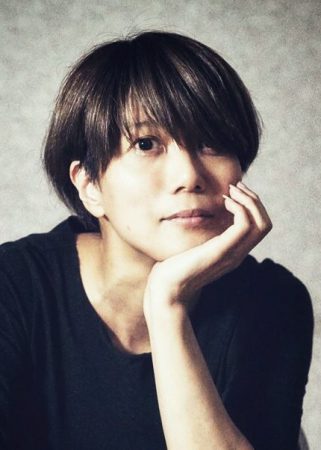Yukiko Mishima is a female Japanese director who has directed and written a number of films, including Shiawase no pan (2012), Night’s Tightrope (2016) and A Drop of the Grapevine (2014). Previously, she had worked as a producer and director for documentary programs at NHK in Japan. Her latest film, Dear Etranger was selected as the opening film for 2017’s Toronto Reel Asian International Film Festival. The film involves following the life of a man with children from current and previous wives, trying to do a good job as a father and not be a “stranger” to his family. Read our review of Dear Etranger here.
Ricepaper Magazine conducted an email interview with Yukiko. Her original answers in Japanese are below along with translation graciously provided by Reel Asian staff. We discussed the inspiration for Dear Etranger, roles in Japanese culture and film projects.
JF Garrard: What motivated you to tell this story?
(この話を映画にしようとした動機は?)
Yukiko Mishima (三島有紀子): 動機は3つあります。ひとつには、自分自身父を亡くし、大阪の実家もなくなり、血についてそして家族について考えていたこと。二つ目に、現代の日本が、血や血の繋がり以外のつながりを見直す時期に来ていると感じていたこと。三つ目に、他者と出会い、他者とぶつかるたびに自己の本質が見えてくる、そんな作品を作りたいと考えていたこと。 この3つのエッセンスが、この物語にはありました。
I have three motivations. One is that I lost my father and the house I grew up is gone so I thought about blood and family. Secondly I felt like it is the time for the current Japanese society to consider different forms/types of connections besides blood connections. Thirdly I wanted to make a movie about finding yourself by meeting other people and having conflicts with them. This story contains these three essences.
JFG: What can a man do to be a “good father”? And a woman be to be a “good mother”?
(良き父、良き母になる要素は何でしょう?)
YM: わかりません。良き母とは、良き父とは、の正解は永遠に見つからないのかなと想像します。正解が見つけられたと思っても、それは正解かどうかわかりません。ただ、正解を見つけようとあきらめずに向き合う覚悟がある、ということかなと思います。性別関係なく父性とは?と問われたら、父性とは、「自分が構築した尺度を示すこと」母性とは?と問われたら、「無償の愛」と位置づけています。
I don’t know. What is a good mother and a good father? I would imagine you can never find an answer to that. Even if you think you found an answer you never know if it is the correct one. However you need to keep trying to find the answer. What is fatherhood and motherhood? Fatherhood means ‘Show the value he created’ and Motherhood means ‘Unconditional love’.
JFG: In Japan there have been many tumultuous events in its history of being uprooted and so forth. Are “complicated family units” more acceptable now in Japan than previously?
(日本の歴史上では血を絶やすとか家督を継続する事が大きな問題として取り上げられる事が多いですが、「複雑な家庭」は近年受け入れられる様になっているのでしょうか?)
YM: 日本では 血は水よりも濃い、という言葉があります。血の繋がった血縁者の絆は、どんなに深い他人との関係よりも深く強いものであるというたとえです。ですが、離婚率も再婚率も増加した日本では、変化を余儀なくされてきていると感じます。でも一方で、血にこだわる流れも感じます。日本人という血、家族の血縁のつながりへの強いこだわりは、時に疎外感を生む時があり、恐怖すら感じる時があります。自分個人は、水は血よりも濃い、と思うことが多くありますし、もっと〝個人〝に向き合うべき時が来ているのではないかと考えます。
タイトルにもETRANGERと入れましたが、血が繋がろうと繋がらなくても《自己》以外はみな《他者》であり、《自己》と《他者》との化学反応こそが、生きていくことなのではないかと感じています。
In Japan we say that blood is thicker than water, meaning blood connection is deeper and stronger than any other connections. However in Japan divorce rate and remarriage rate is increasing so the Japanese society needs to change. On the other hand, majority of people still consider the blood tie is important. Being obsessive about Japanese blood and family blood can create alienation of others so that makes me scared sometimes.
In the film title, I put Etranger. Even if you have blood tie or not, beside ‘myself’ is all ‘others’ and the chemistry between ‘myself’ and ‘others’ means living a life.

JFG: How did audiences in Japan and internationally react to this film?
(日本及び海外の観客の反応は?)
YM: 信じる(believe)と書いてまこと(truth)という名前の主人公は一度失敗したことから、家族を最優先させるスタイルで生きている。生活することが第一の専業主婦の奈苗、非日常を求めてしまう奈苗の元夫の沢田、仕事第一でやってきた信の元妻の友佳、初潮を迎え、母親の妊娠に敏感になり、父親への愛憎が爆発する長女の薫、、、、
それぞれのお客様がそれぞれに共感したり寄り添いいろんなことを感じてくださいました。なかでも多かったのは、「血のつながらない家族を描きながら、普遍的な家族のテーマが浮き彫りとなり、個人と他者、自己の本質、パートナー、家族などについて考えたと」という感想でした。
The father’s name is Makoto and the Chinese character of his name means ‘believe’ and the sound of his name means ‘truth’. He failed in his first marriage so with his second marriage he tries to prioritize his family. His wife is a housewife who focuses on having an ordinal life, her ex-husband seeks for non-ordinal life; Makoto’s ex-wife has been focusing on her career, Kaoru (stepdaughter, daughter of second wife) hits her puberty and suddenly becomes sensitive towards her mother’s pregnancy and her love and hate emotion towards Makoto explodes…
Many people could feel sympathy towards different characters and my film and felt various things. Many people told me that they thought about their own family, partner, myself and others, “what is myself?”, etc. because my film makes people aware of a theme of an ordinary family by depicting family members which have no blood tie.
JFG: How long did this take from script to finished film?
(脚本から映画の完成までどれくらい長くかかりましたか?)
YM: 脚本完成から、資金を集めて、キャスティングして、、、と六年間の時間がかかりまし。
The completion of a script, raising funds, casting etc. It took me 6 years.
JFG: Any difficulties in production along the way?
(完成に至るまでの苦労は?)
YM: 地味なお話なので、なかなか企画として通りませんでした。なので、脚本家の荒井さんと一緒にとにかく賛同者をひとりひとり集めて、資金も集めてということを時間をかけて地道に続けました。内容に関しては、大きな出来事がないなかで、ある家族のある一時(いっとき)の風景を記録する。つまり、実際の家族を観ているような感覚で観てもらいたいと思いました。演技に見えないリアリティーの追求を一番に心がけました。
The story is rather subdued so it was hard to gather funding. So together with Mr. Haruhiko Arai, the scriptwriter, we took time to gather funding by getting supporters one by one. The story doesn’t have a major event however it is a record of a family’s life so I wanted the audience to feel like watching a real family. I tried to pursue realistic acting from the actors.
JFG: What advice do you have for aspiring film makers?
(映画製作を夢見ている人たちにアドバイスするとしたら?)
YM: これから、もしかしたら非常に映画づくりのしにくさを感じる時が来るかもしれません。クリエイターにとって自由であることは最大の喜びですが、そんな位置にいけたり、そんな状況を目指すとしても、大きな不自由さの中で表現しなければいけないことが増えるかもしれません。
ですが、先人たちがそうしてきたように、何かしらの風穴をあけることは人間にはできるという可能性を信じています。例えばジャファル・パナヒ監督の『Taxi』のように。どんな状況でも、発信し続けることが映画表現者なのかなと、自分自身もいつも、叱咤しております。
You may find filmmaking difficult. For a creator, being free is the biggest joy but you may have to express yourself with many restrictions. However, like our predecessors I believe people can change things like Taxi by Jafar Panahi.
JFG: What is your next project?
(次回作は?)
YM: 歌というエンターテイメントを織り交ぜながら、過酷な人生を生き抜く女性の物語を企画しています。生きづらい時代になりかもしれません。だからこそ、「風と共に去りぬ」の日本の女性版を歌のエンターテイメント映画として作りたいと思っています。
My next project is about a woman who has to live a hard life but the film also has songs (a musical). It will be a Gone with the Wind Japanese version of musical entertainment.
Find the full Reel Asian program at reelasian.com
